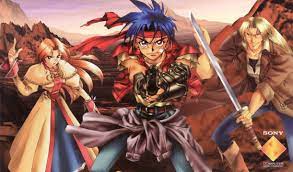When we think of Japanese Role-Playing Games (turn based or action), and some of its most iconic heroes/heroines most of us think of Cloud, Terra, Locke, Zidane, Link, etc. The Final Fantasy series has been the most popular JRPG franchise on the west (let’s pretend for a moment that Pokemon doesn’t exist), and as a by product, its characters are often the most talked about in general discussions.
The Zelda series has been just as popular, and thus Link, has always been one of the more iconic heroes for me. However, with him being a silent protagonist, much of what makes up his “personality” has to be inferred, and even imagined.
However, this list is about the underdogs. The JRPG heroes that no one, or very few ever talk about on forum boards or Facebook chat discussions. So, there will be no Final Fantasy, or Zelda characters on this list, only a few unsung, but equally great heroes that performed incredible feats within their own fictional universes.
Warning: Plot Spoilers Ahead
5. Ryudo (Grandia 2)
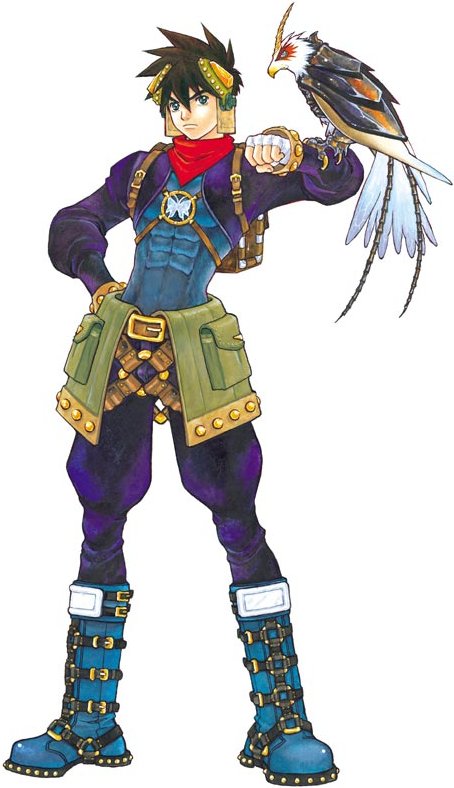
Reluctant Mercenaries were a true and tried RPG troupe in the 1990s. The “Mercenary” class of hero is the easiest character class to place in (almost) every situation imaginable. Proficient at swordplay, and willing to do any type job/deed (evil or good) for money, made these ‘hero’ (or at times ‘anti-hero’) archetypes popular maintains during the 1990s.
In Ryudo’s case, the word ‘Mercenary’ was replaced with ‘Geohound’. A Geohound is described as a “person hired to complete a job regardless of what they think, or what their moral judgement is.
Whether it was thanks to Grandia 2’s better translation (in relation to most of its peers), or to the addition of voice acting (or both), Ryudo, who is a pessimistic jerk at the start of Grandia 2‘s runtime, has more personality and swagger than Final Fantasy VII’s Cloud (the most popular JRPG Mercenary ‘Hero’).
While Grandia 2’s story wasn’t a complex as that of other games in the genre, it was an engaging tale nonetheless. Grandia 2’s plot is driven by Ryudo’s bond with (miss perfect) Elena, and her ‘evil’ (but not truly evil) counterpart, Millenia. The interactions between these characters created one of the more engaging love triangles in a Role-Playing Game of the era.
Ryudo starts his quest within Grandia 2’s plot by taking a job that has him escorting (as a bodyguard) a Songstress of the church of Granas (The good god), Elena, from a small village (Carbo) to a haunted tower. Elena is to perform a ritual that will drive away the “evil spirits” from the woods surrounding the village. Things go south quickly, and Elena is possessed by the Wings of Valmar (The evil god).
Shortly after this, Ryudo is trust unknowingly into a world trotting quest in which he ends up confronting his painful past, and vanquishing evil for what a mostly “happily ever after” ending for himself and most of the other party members.
Unlike other JRPG protagonists, Ryudo has clear cut reasons for being pessimistic, distrustful, and a jerk at the start of the game. His life came crashing down years before taking up the ‘Elena Bodyguard’ Job, when his brother, Melfice, went full blown evil and killed his fiancé (Ryudo witnessed the murder, of course).
Melfice’s fiancé (Reena) was a like a sister to Ryudo, and thus, our young hero experienced both, the tragedy of losing a sister violently, and worst, the betrayal of the person he loved the most in Melfice. Yeah, Ryudo had every reason to be angry, and pessimistic about life.
That said, Ryudo remained a good kid. In fact, his entire “Jerk” act is a self defense mechanism. He is afraid to become attached to someone again as he might fear losing them, or being betrayed again. Thus, he treats Elena harshly early on, even as he confesses to his talking pet companion Skye, that he feels sorry, and is over protective of Elena, and that he regrets his treatment of her.
Ryudo didn’t agree to stick with Elena for money (this is what he wants everyone to believe), he stuck with her because he felt responsible for what befell her (the Wing’s possessing her), and because he took a romantic liking to the girl. Eventually, he also takes a liking to Millenia. So, Ryudo did not only meet the ‘good hearted’, but reluctant ‘hero’ requirements of the JRPG greatness, but he also fulfilled the reluctant “Ladies’ man” role to perfection too.
By the end of the game, Ryudo had turned into a bonafide leader, and self-less hero. After overcoming unsurmountable odds while saving the world, only one question remained: Who did Ryudo pick, Elena or Millenia? The game leaves that up to the player’s imagination, but I am firmly entrenched in Millenia’s camp.
4. Alundra (Alundra)
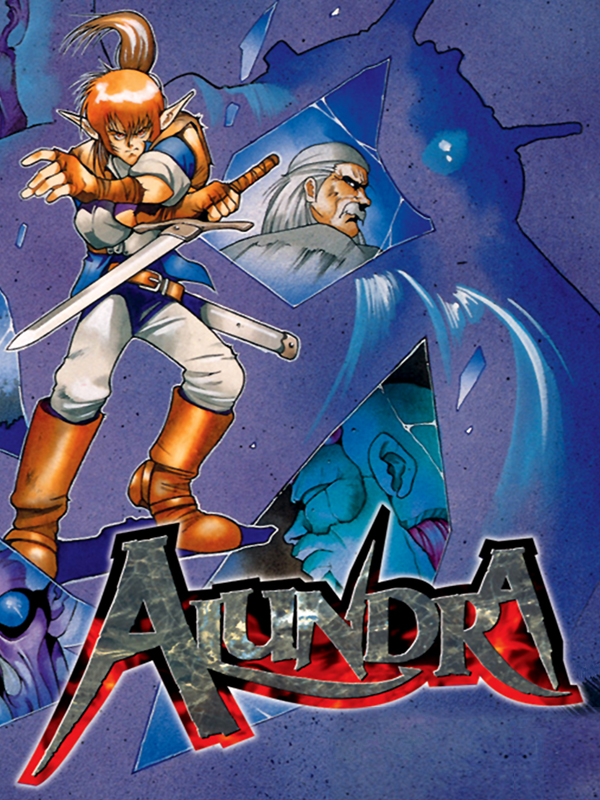
In the realm of silent RPG protagonists, perhaps none is more popular than Zelda’s Link, and Chrono Trigger’s Crono, and yet, Alundra is worthy enough to stand tall amongst the former two.
Alundra (the game), as an action-RPG ‘Zelda clone’, naturally features a pointy eared protagonist, who also happens to be a master swordsman, and is willing to help everyone selflessly.
What makes Alundra’s predicament somewhat different from Link’s, is the fact that he is fighting a ruthless (pure) evil force in Melzas, that has no qualms about murdering innocent villagers (mostly in their sleep). Thus, Alundra’s powers as a “Dreamwalker” (meaning he can enter people’s dreams and save them from the deadly nightmares), come in handy in saving (the ones that he can) Inoa’s villagers.
Alundra battles the hordes of the demon Melzas, both in the dream world, and the physical world. Eventually, Alundra confronts Melzas and puts an end to his reign of terror. Of course, he wasn’t able to accomplish this before witnessing much death, horror, (presumably) falling in love with a hottie named Meia, and conquering many hellish dungeons whose difficulty would have had Link himself shaking in his boots.
While Alundra’s ending hints at upcoming adventures after parting ways with Meia, there would never be a true sequel to his story (Alundra 2 is unrelated). Thus, Alundra’s historical heroic deeds will remain those chronicling his battle to save Inoa from the evil Melzas, and his eventual conquest of the aforementioned hellish demon.
3. Meis Triumph (Thousand Arms)
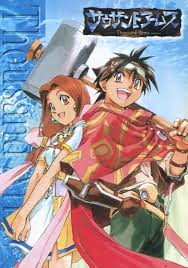
Hail! The King of Womanizing JRPG heroes is here. At only 16, Meis Triumph (which is a more positive last name than ‘Strife’) was a rich, and promiscuous heir to a famous Spirit Blacksmith (and equally womanizing) father. At the very least, Meis breaks the mold of the dark, moody, and introverted JRPG hero.
Thousand Arms sticks to the 101 book of JRPG stories. Meis does not escape the typical JRPG hero’s fate of toppling an evil empire, but his reasons for battling the Dark Acolytes range from revenge for being displaced from his lazy life of riches to romanticizing women across the globe.
Thankfully, Meis (who does have a love interest in Sodina) can justify his cheating, and ah…horny ways?…by claiming that the more intimate that he gets with different women during his quest, the more powerful weapons he will be able to forge (as a spirit blacksmith) in order to save the world.
Yep, what a stud. What a hero. Ah…to be sixteen and ah…uncontrollably ‘enthusiastic’ again! Meis makes for some of the most hilarious moments in any JRPG, and I am glad that I got to save the world, while breaking hearts as him.
Where other heroes are confined to a single, or perhaps two love interests while involved in complex, dark and tragic quests. Adventures, where they unexpectedly (expectedly) find out obscure and terrifying details about their own pasts. Meis breaks all established conventions, as he is a spoiled lazy brat cursed to save the world by dating beautiful women (at least nine of them) in a globe trotting romp…yeah, Meis rules.
2. Rudy Roughknight (Wild Arms)
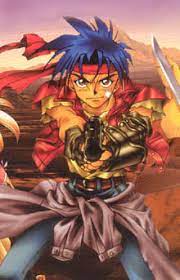
While not possessing the most creative of names, Rudy, was the main hero to (arguably) the PlayStation’s best RPG pre-FFVII era in Wild Arms. Rudy, like other JRPG protagonists, has a dark past, unusual abilities, and a lot like Ryudo (and other JRPG studs) is exiled from his village after scaring off the simple minded masses with his powerful ARM.
In keeping with the “Mercenary” tradition (though to its credit, Wild Arms did it before FFVII did), Rudy turns into a ‘Drifter’, and he is 15.
Yes, every single hero in this (and in 99% of JRPGs) is underaged. As weird as it sounds, it seems that for the Japanese, 15-18 is the prime age for world saving endeavors.
Obviously, most of us were 12-15 years old ourselves when we first played these games. Thus, I have to assume that the developers were just trying to target their audience with relatable characters. That said, Rudy is a fine hero within Wild Arms’ steam punk western setting.
Eventually, Rudy has to come to grips with his dark past, as he discovers that he is a Holmcross, an artificial human created as a weapon. By being raised by Zepet (an adoptive grandfather figure), however, he learnt human values, and morals, which helped him to avoid the typical “mindless killer robot” fate.
Yet, despite not being a being made of ‘flesh and bones’, Rudy shows powerful human traits throughout Wild Arms’ runtime. His coolness, and caring demeanor makes him the ultimate android hero within the game’s epic setting.
Rudy (along Cecilia and Jack) must battle an ancient evil intent on the destruction of the world. Wild Arms’ story is one of the more epic tales that you will find in the genre (pre or post FFVII). Given the complexity of the plot, one would think that Rudy has some great dialogue lines in the game, but that is far from the case.
Surprisingly, Rudy is a silent protagonist, save for two spoken lines (which apparently did not exist in the Japanese script). Given how awesome Wild Arms’ plot is, I have no choice but to classify Rudy as one of the greatest silent protagonists in the genre.
Rudy is not talked about in the same breath as Crono, or Link, but he certainly deserves an honorable mention.
1. Eon/Zeruge (The Granstream Saga)
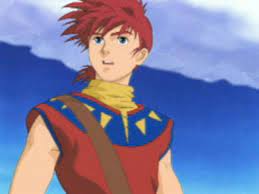
Eon is my favorite dark horse in a list full of dark horses. Out of all of the protagonists listed here, Eon takes part in what is, by far, the worst game of the five.
To be fair, Grandia 2, Alundra, and Wild Arms are bonafide greats (even by the more strict critical of standards of the era). Thousand Arms is at the very least ‘good’. Eon, however, had no such luck as he starred in The Granstream Saga, which is the very definition of an ‘average’ JRPG.
Just like everyone has that ‘bad’ game that they like, The Granstream Saga is a bad game (judged impartially as a game critic, myself) that I loved. Its story, and premise are just too awesome for me not to be invested in the game.
The Granstream Saga had the ‘first’ realtime 3-D action combat system on the PlayStation, and that made it a different RPG, at the time. Back in 1998, in a sea of turn-based JRPGs, The Granstream Saga was breath of fresh air.
Eon is not too different from other heroes mentioned on this list. He is an orphan, has an unknown past, has an unusual gift (his orb/scepter), seems to be a teen, is involved in a love triangle, and must battle an evil empire.
At the very least, Eon is not mute. Therefore, we get a glimpse at his caring, and heroic personality right from the get go. He eventually finds himself caught in a love triangle between Arcia (the good natured, innocent, quiet, and caring girl), and Laramee (the hot, angry, hard to get, but yet, equally caring girl).
The Granstream saga has an interesting setting with Air Pirates, and Floating continents that are slowly (but surely) sinking into their oblivion . It is cool that the game featured these things way before Skies of Arcadia arrived on the Dreamcast. But Eon, and Arcia’s plight goes further back than the game’s start. In fact, they are reincarnated versions of Zeruge, and Ellemera who were a prince and princess from a distant past.
They had loved each other before, but Eon (then Zeruge) had merged with a demon and turned into the world’s greatest evil being. Their love ended in tragedy, which why is Eon’s quest in the Granstream Saga is meaningful.
Eon is oblivious to his past life as Zeruge in his current incarnation, as is Arcia (of her identity as Ellemera). Yet, they meet each other again, as if destined by fate (how romantic). Unfortunately, Arcia is very annoying, helpless, and usually causes more trouble than good, as she is in constant need of saving. Eon, however, as the ultimate knight in shining armor keeps saving her from all perils.
In the end, Eon suffers traffic loss after tragic loss, as all of his closest allies die or sacrifice themselves to aid him in the quest. But the motherlode of all sacrifices comes right before the final battle when Eon must sacrifice his “one true love” in order to defeat Deemar, who is Mah Oh’s (the demon that first had merged with Zeruge) current host.
Eon, who spent his story time saving the continents from sinking, while helping people in distress only to see everyone he cares about die, is played a cruel joke by fate. He is the unluckiest of heroes. Eon is forced to sacrifice his one true love at the end of the story in order to save (himself), his secondary love, and the world.
Keep in mind, that he faces this terrible cross roads after finding out about his dark, and terrifying past. Talk about a tragic hero. The world (at least I do) loves tragic heroes.
Regarding the sacrificial love, I preferred Laramee over Arcia, as his one true love. So, I sacrificed Arcia in the hopes of a happy ending with the blue headed beauty (Laramee). Fortunately, the game allows you to save right before deciding which love interest Eon will sacrifice. Thus, making it easy to see both endings. Unfortunately, Arcia’s (the ‘she lives’ ending) seems the be the canonical one (even it if doesn’t quite make sense).
Either way, Eon had to face a decision no hero would want to make in sacrificing one his romantic loves (Meis would have suffered a stroke). He does so, and proceeds to kick the villain’s rear end, saving the world from evil destruction.
From humble (but in reality, truly glorious beginnings as Zeruge) to a tragic ending, Eon embodies the spirit of a true JRPG hero. If it wasn’t for the game’s awful translation, the Granstream Saga might have been ‘Shakespeare-ingly’ great .
Agree with the author? Couldn’t disagree more and are frothing at the mouth to tell him? Leave a comment here, on Facebook or send an email and make sure to follow Never Ending Realm on Facebook, Twitter, and YouTube!
